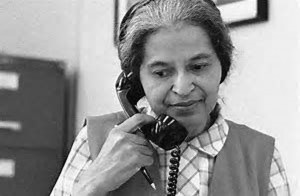Rosa Parks led the fight against sexual assault before the Montgomery Bus Boycott
2nd January 2018 · 0 Comments
By Frederick H. Lowe
Contributing Writer
(Special from NorthStar News Today) – Charges of sexual harassment and sexual assault dominate today’s news but most people don’t know about the role Rosa Parks played in fighting sexual assault on behalf of Black women and black men long before the term became a household word.
Parks is best known for helping launch the successful Montgomery Bus Boycott by refusing to give up her seat to a white man on a segregated Montgomery, Alabama bus, an act which led to her arrest.
African-American men and women forced city officials to change laws by walking to their destinations instead of riding the bus, which nearly put the bus company out of business.
The boycott began December 1, 1955, and ended 381 days later when city officials and owners of the Chicago-based bus company agreed to let African Americans sit anywhere on their buses.
In the past, Blacks had been ordered to sit in the back of the bus behind a rope stretched across the middle aisle.
Before Parks became that fight’s human face, she joined the National Association for the Advancement of Colored People in 1943 to work specifically on protecting Black men from false sexual assault allegations and lynchings. She also worked to ensure that Black people who had been sexually assaulted by whites would get their day in court, according to the website History.com.
This was an important issue for Parks because in 1931, a white-male neighbor attempted to rape her. “I was ready to die, but I didn’t give my consent, never. Never, never,” she said.
One of her most-important cases involved Recy Taylor, a 24-year-old Black woman who was gang-raped by six white men on September 3, 1944, as she was walked to her home in Abbeville, Alabama after attending church. Taylor’s father reported the crime to the sheriff, who found two of the men who participated in the rape. The two men named the others.
Days later, information about the rape reached the NAACP’s Montgomery, Alabama office. Parks went to Taylor’s home and when she arrived, the sheriff was waiting for her. He ordered Parks to get out because he considered her a troublemaker.
Instead, Parks launched the Committee for “Equal Justice for the Rights of Mrs. Recy Taylor,” which received national attention. A grand jury, however, refused to indict any of the rapists after portraying Taylor as a prostitute. In 2011, the State of Alabama issued an apology to Taylor.
On December 15, “The Rape of Recy Taylor” a documentary, giving Taylor, who is still alive, a chance to tell her story. She is 97. Nancy Buirski directed the documentary.
This article originally published in the January, 2018 print edition of The Louisiana Weekly newspaper.




